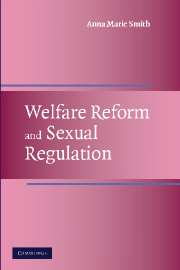Book contents
- Frontmatter
- Contents
- Acknowledgments
- Introduction
- 1 From Paternafare to Marriage Promotion: Sexual Regulation and Welfare Reform
- 2 Biopower and Sexual Regulation
- 3 Post-Foucauldian Sexual Regulation Theory
- 4 The Ideological Construction of Paternafare
- 5 Paternafare Law Today
- 6 Welfare Reform, Reproductive Heterosexuality, and Marriage
- 7 The Normative Assessment of Paternafare: An Ideal-Type Analysis
- 8 Feminist Visions
- Appendix I Gender, Race, and the TANF Population
- Appendix II Family Structure and Poverty
- Appendix III Child Support Enforcement Allocations in a Neoliberal Fiscal Environment
- Appendix IV The “Swarming” of Paternafare
- Appendix V The Disconnection between Poverty and TANF Assistance
- Appendix VI Race, Ethnicity, and the Family Cap
- Index
3 - Post-Foucauldian Sexual Regulation Theory
Published online by Cambridge University Press: 05 June 2012
- Frontmatter
- Contents
- Acknowledgments
- Introduction
- 1 From Paternafare to Marriage Promotion: Sexual Regulation and Welfare Reform
- 2 Biopower and Sexual Regulation
- 3 Post-Foucauldian Sexual Regulation Theory
- 4 The Ideological Construction of Paternafare
- 5 Paternafare Law Today
- 6 Welfare Reform, Reproductive Heterosexuality, and Marriage
- 7 The Normative Assessment of Paternafare: An Ideal-Type Analysis
- 8 Feminist Visions
- Appendix I Gender, Race, and the TANF Population
- Appendix II Family Structure and Poverty
- Appendix III Child Support Enforcement Allocations in a Neoliberal Fiscal Environment
- Appendix IV The “Swarming” of Paternafare
- Appendix V The Disconnection between Poverty and TANF Assistance
- Appendix VI Race, Ethnicity, and the Family Cap
- Index
Summary
The Limitations of Foucauldian Theory
Biopower theory allows us to understand the linkages between modern governance and welfare reform, and it is particularly useful where the analysis of “swarming” is concerned. It is nevertheless true that the Foucauldian theory of sexual regulation has several blind spots that make its application to the American welfare reform case rather difficult. To take but one example, the confessional mode of discipline is central to Foucault's conception of biopower. Foucault suggests, for example, that even when modern societies go through ostensibly reactionary antisex periods in which frank discussions about eroticism and sexuality are censored, they nevertheless continue to produce sexual discourse at a copious rate insofar as they launch investigations into alleged immorality, press accused perverts to confess their sins in public, and build up bodies of “scientific” research on the etiology of deviance. Foucault genealogically traces the modern psychiatrist's invitation to the analysand to put his or her sexual fantasies and dreams into words back to the monastic ritual of the confession.
Sexology and psychiatry bring the sexual subject into being, as it were, by inviting the analysand to reveal the truth of the unconscious by capturing its traces within structured forms and expressing them in language. The protosubject is incited to give the wild and unruly dreamworld the orderly form of narrative fragments, to describe sexual practices as if desire could have a fixed and coherent object, to report on one's experience of the body as if self-mastery could be taken for granted, and to take up identities and inhabit a taxonomic tableau as if misidentification were not at the heart of every identification.
- Type
- Chapter
- Information
- Welfare Reform and Sexual Regulation , pp. 53 - 84Publisher: Cambridge University PressPrint publication year: 2007



